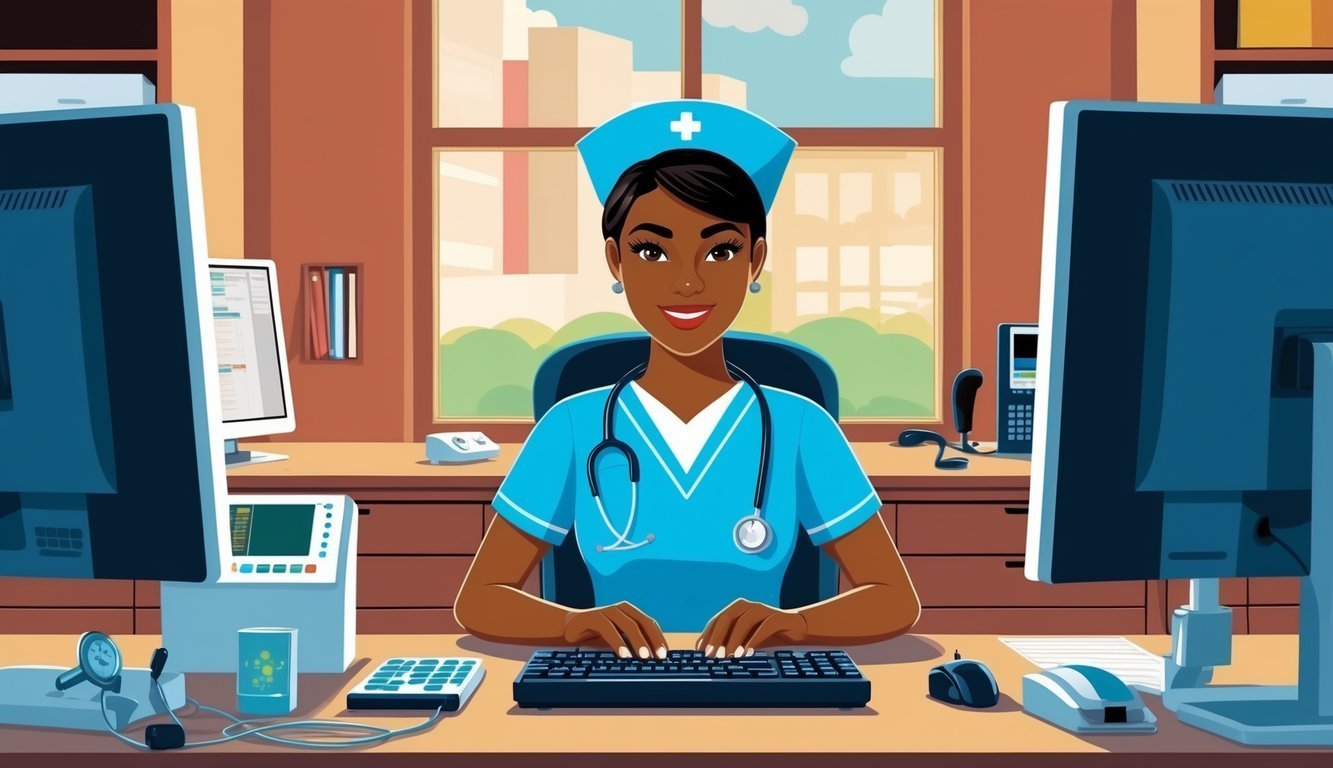Becoming a nurse coder can offer a fulfilling career path that combines your nursing expertise with the critical skills of medical coding. Nurse coders are essential in ensuring accurate medical billing and compliance with healthcare regulations.
As a nurse coder, you will analyze patient records, assign appropriate codes for services rendered, and collaborate with healthcare professionals to improve patient care documentation.
This role not only provides a chance to leverage your nursing background but also opens doors to new job opportunities in various healthcare settings.
According to career resources, nurse coders earn competitive salaries, with figures indicating an average annual income of around $57,182.
If you are contemplating a transition from bedside nursing to coding, you will find a supportive community and ample resources to help you succeed.
Transitioning to a nurse coder role can be particularly appealing if you’re seeking a less physically demanding position while still playing a vital role in patient care.
Explore resources on how to become an RN coder and understand the certification process to get started on this rewarding journey.
Nurse Coder Profession Overview
As a nurse coder, you occupy a unique position that combines nursing expertise with coding proficiency.
This role is crucial in ensuring accurate billing and documentation within healthcare settings.
You will engage with various responsibilities that distinguish you from traditional nursing roles while following a specific career pathway tailored for coding professionals.
The Role of a Nurse Coder
Your primary responsibility as a nurse coder is to translate patient diagnoses, treatments, and procedures into standardized medical codes.
This coding is essential for accurate billing and insurance claims, enabling healthcare providers to receive proper reimbursement.
Typical tasks include:
- Reviewing Medical Records: You will analyze patient charts to extract relevant data for coding.
- Applying Coding Standards: Make sure to familiarize yourself with coding systems like ICD-10, CPT, and HCPCS.
- Collaboration: You may work closely with healthcare providers to resolve discrepancies in documentation.
The role empowers you to ensure the integrity of healthcare information and optimize revenue cycle management for your organization.
Comparison to Traditional Nursing Roles
While you might share foundational nursing knowledge with registered nurses, your focus diverges significantly.
Traditional nursing roles emphasize direct patient care, while your work centers around coding accuracy and documentation.
Key differences include:
| Aspect | Nurse Coder | Traditional Nurse |
|---|---|---|
| Patient Interaction | Minimal | High |
| Core Responsibilities | Coding and billing | Patient care and assessment |
| Required Skills | Coding knowledge, detail-oriented | Clinical skills, empathy |
You utilize your clinical knowledge to enhance patient record accuracy, but you do not engage in hands-on care.
Both roles are crucial to the healthcare ecosystem, serving distinct but complementary functions.
Career Path for Nurse Coders
To enter this profession, you typically start as a registered nurse (RN) with either an ADN or BSN.
Following this, pursuing certifications in medical coding will enhance your qualifications.
Certification options include:
- Certified Professional Coder (CPC)
- Certified Coding Specialist (CCS)
As a nurse coder, the average annual salary can vary significantly based on experience and certifications, often ranging from $65,000 to $75,000.
Continuous education and gaining advanced certifications can further increase your earning potential and open doors to more specialized roles within healthcare administration.
This pathway not only boosts your career growth but also expands your expertise within healthcare’s crucial coding framework.
To learn more about the profession, you can explore resources like NurseJournal.
Educational Requirements

To become a successful nurse coder, you need to complete specific educational paths that emphasize both nursing and coding competencies.
This includes obtaining relevant degrees and certifications, which will enhance your knowledge and marketability in the healthcare field.
Nursing Degrees and Certifications
Your journey typically begins with a nursing degree.
You have the option to pursue:
-
Associate Degree in Nursing (ADN): This foundational program usually takes about two years to complete and prepares you for entry-level nursing jobs.
-
Bachelor of Science in Nursing (BSN): A four-year degree that provides a more comprehensive education and is increasingly preferred by employers.
Obtaining a nursing license is essential.
You’ll need to pass the NCLEX-RN exam after graduating.
Many nursing programs now offer online nursing degrees for flexibility.
Medical Coding Certifications
In addition to your nursing qualifications, you’ll need to acquire medical coding certifications to excel as a nurse coder.
One prominent certification is the Certified Professional Coder (CPC) offered by the American Academy of Professional Coders (AAPC).
To obtain this certification, candidates must have two years of coding experience, or they can begin as apprentices until obtaining the required experience.
Additionally, other certifications, such as those from AHIMA, like the Certified Coding Associate (CCA), are also valuable in advancing your career.
Engaging in continuous education is crucial to remain up-to-date with the ever-evolving coding standards.
Core Knowledge and Skills

To excel as a nurse coder, you need a specific set of core knowledge and skills.
These include a solid grasp of medical terminology and anatomy, keen attention to detail paired with analytical abilities, and proficiency in health information technology.
Medical Terminology and Anatomy
A thorough understanding of medical terminology and anatomy is vital for accurate coding.
You will frequently encounter terms related to anatomy, physiology, and pharmacology when reviewing patient charts.
Familiarity with key coding systems like ICD-10, CPT, and HCPCS is also essential.
Moreover, recognizing abbreviations and medical jargon helps ensure precision in clinical documentation.
Here’s a brief list of terms you should know:
| Term | Description |
|---|---|
| ICD-10 | International Classification of Diseases, 10th Revision. |
| CPT | Current Procedural Terminology, for medical procedures. |
| HCPCS | Healthcare Common Procedure Coding System, for various services. |
This knowledge allows you to accurately interpret medical records and apply the correct codes, minimizing billing errors.
Attention to Detail and Analysis Skills
Attention to detail is crucial in the world of medical coding.
You must meticulously analyze patient charts and clinical documentation to ensure accurate coding.
Missing even a small detail can lead to incorrect coding and potential revenue loss for healthcare facilities.
Your analytical skills will help you assess complex medical situations and determine the appropriate codes for various diagnoses and procedures.
Creating a checklist or using coding software can assist in this process.
Here are some considerations:
- Double-check codes against patient records.
- Look for discrepancies in documentation.
- Ensure compliance with regulations.
This attention to detail is not just about accuracy; it also impacts overall patient care and financial aspects of healthcare services.
Health Information Technology Competency
As a nurse coder, you must be proficient in health information technology.
Familiarity with electronic health record (EHR) systems enhances your ability to navigate patient information seamlessly.
The use of coding software can streamline the coding process, allowing for efficient claims submission.
You should also stay updated on emerging technologies and coding guidelines.
Understanding how to leverage health information technology means you can ensure both security and accuracy in your coding practices.
Key areas of focus include:
- EHR navigation skills.
- Knowledge of coding software.
- Compliance with data protection regulations.
Developing these competencies positions you for success in the constantly evolving healthcare landscape.
Certification and Continuing Education
As a nurse coder, obtaining the right certifications and engaging in ongoing education are crucial for career advancement.
Certifications validate your skills and knowledge while continuing education ensures you stay up-to-date with industry standards.
Types of Coding Certifications
There are several key certifications that you can pursue in the field of medical coding.
Each serves different roles and specialties:
-
Certified Professional Coder (CPC): Offered by the AAPC, this is the most recognized certification. It focuses on coding outpatient services and is ideal for those in clinics or physician offices.
-
Certified Coding Specialist (CCS): This certification, provided by AHIMA, emphasizes inpatient coding and is focused on hospital settings.
-
Certified Inpatient Coder (CIC): Also from AAPC, this certification specializes in coding for inpatient services.
-
Registered Nurse and the NCLEX-RN: If you hold RN status, consider how your nursing education can complement coding roles.
Obtaining these certifications often requires passing a certification exam, which tests your coding knowledge and skills.
Exam Preparation Strategies
To prepare effectively for certification exams, consider these strategies:
-
Enroll in a Medical Coding Program: Choose an accredited program that aligns with the certification you’re pursuing. Ensure it covers all necessary coding guidelines and techniques.
-
Utilize Practice Exams: Practice tests can help familiarize you with the exam format and identify areas for improvement.
-
Study Groups: Join or form a study group with peers. Collaboration can enhance your understanding and retention of complex material.
-
Access Study Resources: Seek resources from organizations like AAPC or AHIMA, which offer materials tailored to the certification exams.
Effective preparation is essential to increase your chances of success.
Maintaining Certification Through CEUs
Once you have obtained your certification, maintaining it requires ongoing education.
You need to earn Continuing Education Units (CEUs) periodically.
Here’s how you can manage this process:
-
Set a Schedule: Plan to complete your CEUs ahead of time to avoid last-minute efforts. Most certifications require a specific number of CEUs every two years.
-
Participate in Workshops and Webinars: These are often provided by professional organizations and are convenient ways to accrue CEUs while staying updated on industry developments.
-
Accredited Programs: Ensure your continuing education sources are accredited. This guarantees that the CEUs will count towards renewal of your certification.
Using resources from the AAPC or AHIMA can provide further insights into maintaining your certification.
Work Environment and Job Market
The work environment for nurse coders combines elements of healthcare settings and flexibility in job options.
Understanding these aspects can help you determine how best to fit your career in medical coding into your lifestyle and professional goals.
Healthcare Settings and Specializations
Nurse coders typically work within various healthcare settings, including hospitals, clinics, and outpatient facilities.
Your role may focus on coding patient records, billing, and insurance claims.
Each setting requires distinct specializations.
For example, a risk adjustment coder is essential in value-based care, ensuring accurate coding to reflect patient complexities.
Moreover, positions such as medical records specialists may focus more on data management aside from coding tasks.
The desired specialties can influence your day-to-day duties and expectations in a coding career, so it’s crucial to explore areas that align with your interests.
Full-Time vs. Contract Positions
When considering your career in medical coding, you will encounter both full-time and contract positions.
Full-time roles typically offer stability, benefits, and consistent clinical hours.
These roles tend to have higher salaries due to the comprehensive nature of the job and the need for expertise in medical billing and coding.
Contract positions provide flexibility and can be appealing for those seeking work-life balance.
Although they may not offer the same level of salary and benefits, they allow you to work on a project basis, which can sometimes lead to higher hourly pay.
Assessing the pros and cons of each can guide your decision.
Remote Work Opportunities
The rise of telehealth and digital record-keeping has created significant remote work opportunities in the field of medical coding.
Many employers are now considering candidates for remote coder positions.
This allows you to work from home while maintaining a flexible schedule.
Remote roles in medical coding also provide a chance to balance personal commitments with professional responsibilities.
They require access to patient records and coding software, but many companies provide the necessary resources.
Look for positions that highlight remote work as a perk to broaden your job search effectively.

